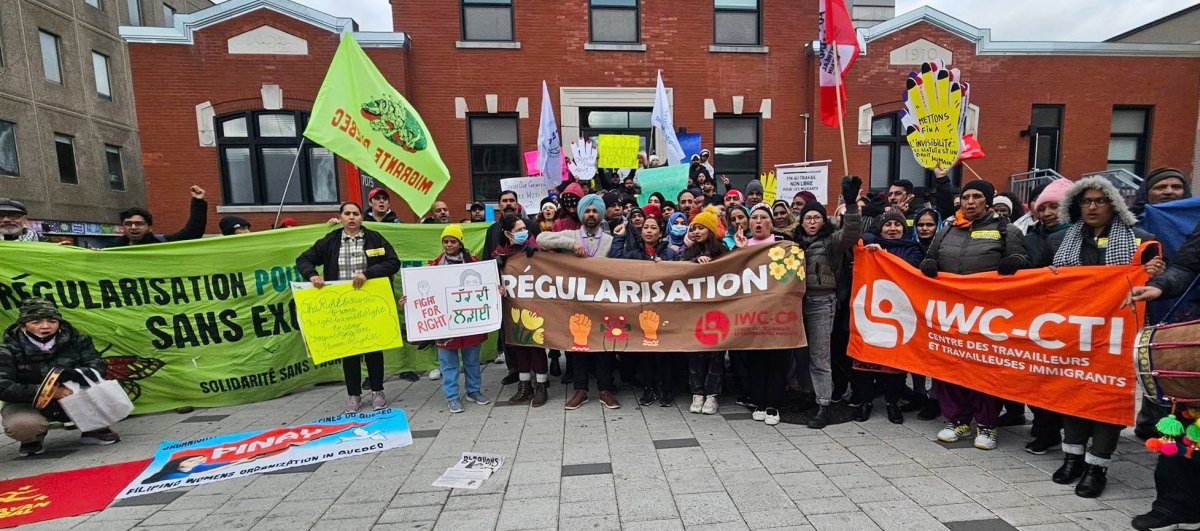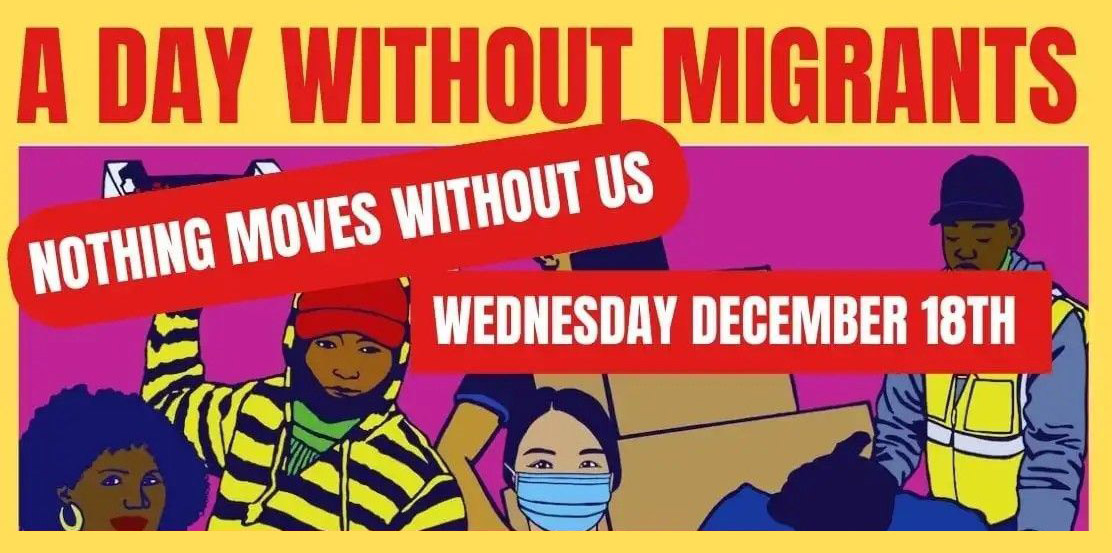Wednesday, December 18, 2024
December 18, International Migrants Day
Demand Status and Dignity for
All
Migrant Workers
CALENDAR OF
EVENTS
•
Demand Status and Dignity for All
Migrant Workers
• Care Workers Testify to Abuse and Broken Promises
For Your Information
• Origin of International Migrants Day
• A Glimpse at International Migration
December 18, International Migrants Day
Demand Status and Dignity for All Migrant Workers
The United Nations has designated December 18 as International Migrants Day to recognize the contributions of the more than 281 million migrants worldwide who are indispensable to the functioning of almost every country around the globe. In Canada, Quebec, the U.S., countries in the European Union and so-called western democracies and other countries under the dictatorship of global oligopolies, migrant workers are treated like modern day slaves to be used and discarded by the rich to maximize their privileges and wealth.
There is no recognition that migrants are human beings who have rights by virtue of being human in countries like Canada which shamelessly claims to be a champion of human rights and freedoms.
This International Migrants Day, the Communist Party of Canada (Marxist-Leninist) calls on everyone to step up their support of migrant workers in Canada and Quebec who are an integral part of one working class, and by doing so, contribute to the struggles of migrant workers across the globe. The Canadian state's divisive racist attacks against migrant workers, international students and refugees must be ended immediately, and these workers granted permanent status so that they can live with dignity and security and continue to make their invaluable contributions to society without being criminalized.
The International Migrants Alliance (IMA)-Canada, part of an international network of defence organizations of migrant workers, has called for actions this International Migrants Day under the theme: "A Day Without Migrants," to highlight the enormous contributions migrant workers, international students and refugees make to Canadian society and to demand that the Canadian government and monopoly media end their vicious attacks against this section of the people. Standing as one with all workers in Canada to oppose a system that exploits all workers, the IMA has called for rallies, forums and other events to highlight the myriad contributions of migrant workers and the struggle to defend their rights and the rights of all.
Similarly, the Migrant Rights Network (MRN), a cross-Canada alliance of organizations fighting for migrant justice and to combat state-organized racist attacks against farm workers, care workers and others designated as temporary foreign workers, international students, undocumented people and refugees, has organized actions under the theme A Day Without Migrants -– Nothing Moves Without Us! The MRN denounces the disinformation spread by government Ministers and officials, and the media blaming immigrants for the housing crisis and the crises in health care, education and social services. This is done to cover up the fact that these problems which affect everyone are caused by decades of the anti-social policies of successive federal and provincial governments. The fraudulent claim that immigrants are to blame is being used to justify increased attacks on migrant workers and students in the form of brutal cuts to immigration levels, quotas on the number of international students Canada will accept, new rules for the Temporary Foreign Workers Program and reduction in the number of refugees admitted into Canada.
The MRN calls on everyone to join together to demand permanent resident status for all, fair treatment and equality, jobs with dignity, and to step up the fight of the working class and people for a world where the racist exploitation and abuse of migrant workers particularly from Asia, Africa, Latin America and the Caribbean is brought to an end.
All Out to Make International
Migrants Day a Success!
End Canada's
Racist Immigration and Refugee Policies!
Status for All!

Montreal, November 2, 2024
Care
Workers Testify to Abuse
and Broken Promises
Last week migrant care workers came together in an emotional press conference, demanding immediate action on the government's delayed promises for permanent residency. Despite the heartbreak, careworkers are bravely speaking up and now we need your help to amplify their voices.
Promised Care Worker Program Unimplemented
 On June 3, 2024,
Immigration Minister Marc Miller announced new
Caregiver Pilot programs to grant care workers permanent residency on
arrival without unfair education and language barriers. This policy
change came because migrant care workers with your support have been
fighting for decades. Six
months later, these programs remain unimplemented, leaving
thousands -- predominantly women from racialized
communities -- stuck in precarious jobs, separated from their
families, and at risk of becoming undocumented.
On June 3, 2024,
Immigration Minister Marc Miller announced new
Caregiver Pilot programs to grant care workers permanent residency on
arrival without unfair education and language barriers. This policy
change came because migrant care workers with your support have been
fighting for decades. Six
months later, these programs remain unimplemented, leaving
thousands -- predominantly women from racialized
communities -- stuck in precarious jobs, separated from their
families, and at risk of becoming undocumented.
Keep the Promise –- Landed Status Now!
Nora Gonzales, who couldn't attend her father's funeral, said:
"Please, Prime Minister Trudeau and Minister Miller, how long do we have to suffer? We have contributed so much to this country's economy. We need permanent residence now!"
Teresa Andrade, separated from her spouse and five children, said:

Jhoey Dulaca, a former care worker, emphasized:
"Caregivers are the backbone of countless families, yet we remain in limbo. This delay has kept us in abusive workplaces and separated from our children."
Julie Diesta, a former care worker demanded action: "Our members are hungry, losing their homes, and this delay is affecting their mental health"
Sign the Petition here: Ensure fairness and equality by guaranteeing permanent resident status for all, including implementing the promised Care Worker program and stop cutting permanent residency.
Care Workers Deserve Justice
As the holidays approach, care workers remind us of the urgency of their demands. As Mila Buton said:
"Christmas is just around the corner. We want answers before then! Permanent residency for care workers must become a reality now!"
Your actions will make a difference. Together, we can win justice for migrant care workers who care for children, sick and the elderly.
To watch and share the video click here.
For Your Information
Origin of International Migrants Day
On December 4, 2000, the United Nations General Assembly, taking into account the large and increasing number of migrants in the world and recognizing the enormous contribution they make to the global economy, the societies they migrate to and the countries they hail from through remittances and in various other ways, proclaimed December 18 International Migrants Day. Remittances, for example, have gone from $128 billion in 2000 to $831 billion in 2022.
A decade earlier, on December 18, 1990, the General Assembly had adopted the International Convention on the Protection of the Rights of All Migrant Workers and Members of Their Families. To view the Convention click here.
Sixty of the United Nations 193 member states are parties (legally bound) to the Convention and 43 are signatories (preliminary endorsement). Interestingly, Canada is neither a party nor a signatory, nor is the U.S. or any of the other so-called Western democracies, including the countries that make up the European Union. So much for all the so-called defenders of human rights!
Message from United Nations Secretary-General
On December 13, United Nations Secretary-General António Guterres delivered a message for International Migrants Day, where he pointed out that this is "a day to remind ourselves of the challenges migrants can face -- from prejudice and discrimination, to outright violence and abuse, to the unimaginable cruelty of human trafficking.
"These challenges are made worse by the rising tide of mis and disinformation and hate speech which sows division and distorts the valuable contributions migrants are making each and every day.
"As a global community, we must summon our common humanity, and work to reverse these harmful trends."
(Source: United Nations)
A Glimpse at International Migration

Migrant caravan leaving
Tapachula, Mexico for U.S. border, December 24, 2023
The United Nations defines an international migrant as any person who has changed his or her country of residence, regardless of their legal status, or the nature, or motive of their movement.[1]
People leave their home country for various reasons, some to seek work or economic opportunity, to join family or to study, while others depart to escape conflict, persecution or human rights violations. Some emigrate because of adverse effects of climate change, natural disasters or other environmental factors.
According to the Population Division of the United Nations Department of Economic and Social Affairs (UNDESA), as of July 1, 2020, the global number of international migrants was estimated to be 281 million, with international migrants comprising some 3.5 per cent of the world's population, compared to 2.8 per cent in 2000 and 2.3 per cent in 1980.[1] Close to three out of four international migrants were aged between 20 and 64 years, while 41 million were under the age of 20. Some 31 per cent of international migrants reside in Asia, with the same percentage also living in Europe, followed by 21 per cent in Northern America (northern-most region of the continent, including Canada and the U.S.) nine per cent in Africa, five per cent in Latin America and the Caribbean and the remaining three per cent in Oceania.
Refugees
"During the year, the global refugee population increased by seven per cent to reach 43.4 million," informs the United Nations Refugee Agency (UNHCR) in its Global Trends: Forced Displacement in 2023 report published in June 2024.[2]
This includes 31.6 million refugees and people in a refugee-like situation and 5.8 million other people in need of international protection under UNHCR's mandate, as well as 6 million Palestinian refugees under UNRWA's mandate. Compared to a decade ago, the total number of refugees globally has more than tripled.
The countries which account for the largest numbers of refugees and other people in need of international protection are Afghanistan and Syria, 6.4 million each, totaling one-third of all refugees under UNHCR's mandate, followed by Venezuela (6.1 million) and Ukraine (6.0).
Most refugees remain near their country of origin, with 69 per cent hosted in neighbouring countries. Many refugees, like Syrians and Palestinians, are not seeking asylum but to return home. They often end up in the refugee camps for years. Those going to the U.S., Canada, Britain and such places are usually seeking asylum.
By the end of 2022, the world had an estimated 35.3 million refugees, including 5.9 million Palestine refugees under the mandate of UNRWA, including 5.4 million who were asylum-seekers.[3]
International Migration to Canada
According to the United Nations Department of Economic and Social Affairs' World Population Prospects 2024, international migration is one of four major demographic trends shaping our world, the others being population growth, population ageing and urbanization.[4] The report says, "In a small number of countries and areas, immigration is projected to attenuate the decline in population size caused by sustained low levels of fertility and an older age structure." Immigration is projected to be the main driver of population growth in 52 countries and areas throughout 2054 and in 62 through 2100 the report goes on to say. This group includes Australia, Canada, Qatar, Saudi Arabia and the U.S.
Also, in a small number of countries including Canada and the U.S., the population is projected to grow by over 23 per cent between 2024 and 2100 largely as a result of immigration. In Canada, as in France and Sweden, more than 20 per cent of the population was already 65 or older in 2024.
International Students
Based on a Statistics Canada report released on November 20, the number of international students has consistently risen across Canada over the past decade and accounted for 21.2 per cent of all college and university enrolments in 2022/2023.[5] Overall, the number of international students more than doubled from 2013/2014 (199,116) to 2022/2023 (468,087). During the same decade, Canadian student college and university enrolments decreased by 5.7 per cent, from 1,842,903 in 2013/2014 to 1,738,095 in 2022/2023.
The same report noted an increase of 16 per cent (+64,524) in 2022/2023 in international student enrolments compared with the previous year, with the majority enrolled in colleges. This steady annual increase brought international student college enrolment growth up nearly 400 per cent, from 54,738 in 2013/2014 to 205,242 in 2022/2023. Fields of study such as business and administration (+20.1 per cent; +24,843) and mathematics and computer and information sciences (+16.1 per cent; +8,511) posted the largest increases for international students nationally in 2022/2023.
The increase in international student college enrolments observed was driven by students from India (+31.6 per cent to 115,119 students), with the number of international students from India studying in Canadian colleges accounting for 56.1 per cent of all international student college enrolments.
Temporary Foreign Workers
A November 27 Statistics Canada Report indicates that temporary foreign workers include work permit holders, study permit holders and asylum claimants engaged in work activity in Canada.[6]
Statistics Canada findings reveal a large increase in the number of temporary foreign workers in recent years, an increase from 356,000 in 2011 to 845,000 in 2021. Interestingly, study permit holders accounted for most temporary foreign workers. These workers and their spouses made up 60 per cent of all temporary foreign workers in Canada in 2021, up from 24 per cent in 2011.
The report also draws attention to a notable shift in "paid employment patterns of temporary foreign workers towards low-paying industrial sectors." For example, close to 140,000 temporary residents were employed in accommodation and food services in 2021, accounting for 17 per cent of all temporary foreign workers. The significant increase in the number of study permit holders has also contributed, according to the report, to "the rapid growth in foreign workers employed in retail trade and in administrative and support, waste management and remediation services, which usually pay low wages." The share of temporary foreign workers employed in these three sectors increased from 34 per cent in 2011 to 42 per cent in 2021.
Refugees and Protected Persons
Whereas in 2022, Canada admitted a total of 74,342 refugees and protected persons as permanent residents, in 2023 it admitted 74,979, which represented a one per cent increase.[7]
Notes
1. Global Issues, International Migration, United Nations
2. Global Trends, June 2024, UNHCR
3. Global Issues, International Migration, United Nations
4. World Population Prospects 2024, United Nations Department of Economic and Social Affairs, Summary of Results, July2024
5. Canadian postsecondary enrolments and graduates, 2022/2023, Statistics Canada, November 2024
6. Research to Insights: Temporary Foreign Workers in Canada, Statistics Canada, November 27, 2024
7. 2024
Annual Report to Parliament on Immigration, Immigration, Refugees and
Citizenship Canada
(To access articles individually click on the black headline.)
Website: www.cpcml.ca • Email: editor@cpcml.ca



